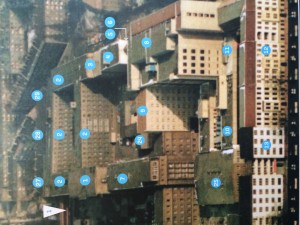Katarina Witt grew up during a time of great conflict in Germany. While she was gaining great fame and glory, her country endured many hardships. Following World War II, tensions began to rise and the countries that were once united against Nazi Germany were pitted against each other. During this time, Germany as well as the capital, Berlin, had been divided into four sections with one of the main Allied powers occupying each section. The capital of the country was a source of great conflict among the powers. Although Berlin was located entirely inside the Soviet Union’s section, the powers agreed to divide the city into similar sections. In 1949, the United States , France, and Great Britain combined their sections of the country and allowed the Federal Republic of Germany, or West Germany, to be established. The Soviet Union did not agree with the ideas of the Western Powers and responded by establishing the German Democratic Republic, or East Germany. Also during this time, there was an East Berlin and a West Berlin. The Soviets, however, did not like having the other powers in Berlin and started working to drive them out. The Soviets decided to create a blockade in West Berlin and to starve the Western power controlled area until they had to leave the city. On the other hand, the Powers reacted by supplying their sectors of the city via planes. This was known as the Berlin Airlift and lasted until 1949. For almost 30 years, this tension between the Eastern and the Western powers, known as the Cold War, continued. Furthermore, a major event of the Cold War occurred in 1961, just years before Katarina was born. The communist government of East Germany started constructing a barbed wire and concrete wall between East and West Berlin. The purpose of the wall was stop the citizens of the East from fleeing to the west and to diffuse the conflict over Berlin. While it was successful in stopping the influx of Germans to the west, it caused many issues for the people in east Germany. Families were separated and only able to communicate through letters. The goods people needed to survive were often not available and the existing goods were not decently distributed. People began to have children in order to obtain housing, as monetary benefits were available if you had kids. Overall, life in east Germany was hard. During the time that the wall was up, dozens lost their lives attempting to escape to the west. After years of protests and backlash over the wall, it finally came down on November 9, 1989.
, France, and Great Britain combined their sections of the country and allowed the Federal Republic of Germany, or West Germany, to be established. The Soviet Union did not agree with the ideas of the Western Powers and responded by establishing the German Democratic Republic, or East Germany. Also during this time, there was an East Berlin and a West Berlin. The Soviets, however, did not like having the other powers in Berlin and started working to drive them out. The Soviets decided to create a blockade in West Berlin and to starve the Western power controlled area until they had to leave the city. On the other hand, the Powers reacted by supplying their sectors of the city via planes. This was known as the Berlin Airlift and lasted until 1949. For almost 30 years, this tension between the Eastern and the Western powers, known as the Cold War, continued. Furthermore, a major event of the Cold War occurred in 1961, just years before Katarina was born. The communist government of East Germany started constructing a barbed wire and concrete wall between East and West Berlin. The purpose of the wall was stop the citizens of the East from fleeing to the west and to diffuse the conflict over Berlin. While it was successful in stopping the influx of Germans to the west, it caused many issues for the people in east Germany. Families were separated and only able to communicate through letters. The goods people needed to survive were often not available and the existing goods were not decently distributed. People began to have children in order to obtain housing, as monetary benefits were available if you had kids. Overall, life in east Germany was hard. During the time that the wall was up, dozens lost their lives attempting to escape to the west. After years of protests and backlash over the wall, it finally came down on November 9, 1989.
All of these events had a huge impact on Katarina’s life and career. During her childhood, Katarina lived in East Germany and at age 9 started training with Jutta Müller, a renowned East German skating instructor. During the time of the Cold War, Katarina became a figure skating champion and a symbol of East Germany’s regime. Since Katarina was such a public figure during this time, the Stasi, the secret government police of East Germany during the Cold War, kept a close eye on her career as well as her personal life. The Stasi, was one of the most ruthless and powerful secret police forces in the world. Their mission was not just to keep enemies out, but also to make sure its most valuable assets stayed there to make the country proud, including world-class athletes like Katarina. The Stasi’s involvement with the figure skater began when they sent Katarina a letter telling her how important it was that she wins the gold medal at the next Olympics. To ensure even more control over her, the Stasi requested Katarina at their meetings so they could make sure that she was training properly and was not distracted from her goal of winning gold at the next Olympics. At one point she wanted to date a member of a band, but Katarina was not allowed because that relationship would be considered a major distraction to her figure skating career. Also, there was a claim that Katarina’s parents were not allowed to see her skate internationally because the East German government feared that she would move to West Germany. However, after the fall of the wall, her parents were able to see her performance at the 1994 Olympics. Additionally, the Stasi interfered with the lives of many other East German citizens with at least one out of three people in East Germany being victimized by Stasi arrest, detention, surveillance, or torture. Some citizens even cooperated with the Stasi agents and sometimes got money or goods as rewards for their assistance. It is said that Katarina was rewarded for her cooperation in a similar way. The Stasi gave her a car, accommodations, and a passport allowing her to travel to the west. The Stasi also censored politics, art and culture, film, and other forms of media like newspapers. In other words, Katarina was clearly not the only East German citizen who was directly affected by the Stasi police. After the fall of East Germany, Katarina’s Stasi files became public revealing just how closely she was watched. This was a huge controversy and gained a lot of attention from all over the world. Currently, her files are kept at the Stasi Museum in Berlin. Overall, it is apparent how important Katarina Witt’s figure skating career was to the East German government. Moreover, it seems that one of the main reasons why Katarina’s success at the Olympics was so important was because it was a chance for East Germany to show their revival after World War II.
telling her how important it was that she wins the gold medal at the next Olympics. To ensure even more control over her, the Stasi requested Katarina at their meetings so they could make sure that she was training properly and was not distracted from her goal of winning gold at the next Olympics. At one point she wanted to date a member of a band, but Katarina was not allowed because that relationship would be considered a major distraction to her figure skating career. Also, there was a claim that Katarina’s parents were not allowed to see her skate internationally because the East German government feared that she would move to West Germany. However, after the fall of the wall, her parents were able to see her performance at the 1994 Olympics. Additionally, the Stasi interfered with the lives of many other East German citizens with at least one out of three people in East Germany being victimized by Stasi arrest, detention, surveillance, or torture. Some citizens even cooperated with the Stasi agents and sometimes got money or goods as rewards for their assistance. It is said that Katarina was rewarded for her cooperation in a similar way. The Stasi gave her a car, accommodations, and a passport allowing her to travel to the west. The Stasi also censored politics, art and culture, film, and other forms of media like newspapers. In other words, Katarina was clearly not the only East German citizen who was directly affected by the Stasi police. After the fall of East Germany, Katarina’s Stasi files became public revealing just how closely she was watched. This was a huge controversy and gained a lot of attention from all over the world. Currently, her files are kept at the Stasi Museum in Berlin. Overall, it is apparent how important Katarina Witt’s figure skating career was to the East German government. Moreover, it seems that one of the main reasons why Katarina’s success at the Olympics was so important was because it was a chance for East Germany to show their revival after World War II.
Sources:
http://abcnews.go.com/Primetime/story?id=132214
http://www.thebiographychannel.co.uk/biographies/katarina-witt/trivia.html;jsessionid=A8FCED0F9D7D32AB0ED8D4A8ECC4BC72
http://www.dailymail.co.uk/tvshowbiz/article-2096359/Dancing-Ice-judge-Katarina-Witt-claims-East-Germanys-communist-regime-spied-having-sex.html
http://www.telegraph.co.uk/news/worldnews/europe/germany/1393249/Stasi-files-reveal-Katarina-Witt-was-willing-accomplice.html
http://spartacus-educational.com/2WWeastGermany.htm

